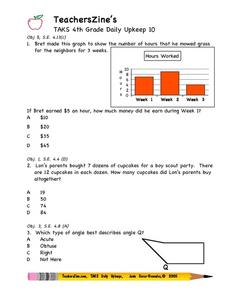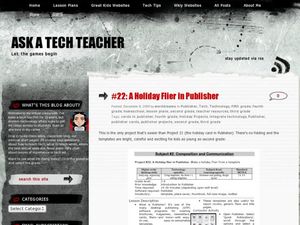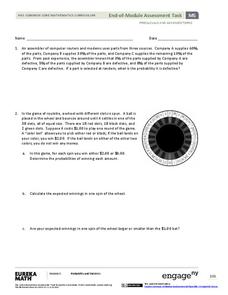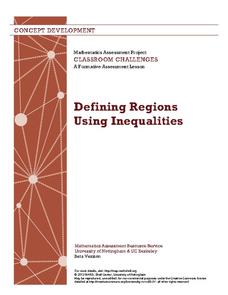Curated OER
Fraction Jeopardy
Students investigate basic concept of fractions by using a version of the game Jeopardy. The game is played using a television monitor or projector for the integration of technology. The lesson is highly engaging and can hold student...
Curated OER
TAKS 4th Grade Daily Upkeep 10
In this math worksheet, 4th graders look for the answers to basic review problems that focus upon the skills of reading simple word problems, and applying the interpretation of data.
Curated OER
This is Jeopardy
This PowerPoint provides review questions and answers from many different subject areas using a Jeopardy format. The topics that are covered include decimals, U.S. history, cells, Australian animals, and biomes. The material was designed...
Curated OER
Fractions Jeopardy
This PowerPoint allows students to review fraction concepts, such as comparing fractions and converting fractions into their simplest form. This interactive review game is in a "Jeopardy" style format.
Curated OER
Holiday Flier in Publisher
Students use Publisher in this lesson to make a holiday flier. In this technology lesson, students create a holiday flier. Students choose fonts, use clipart, use grammar and spelling check, and save to their work to a flash drive or...
Curated OER
History Trifold in Publisher
Learners create a timeline of events happening around the world. In this timeline lesson plan, students use Microsoft Publisher to create a timeline of events happening around the world as they live their lives presently.
Curated OER
Indegenous Cultures Magazine in Publisher
Fourth graders use Publisher to create their own magazine. In this online magazine lesson, 4th graders follow the instructions to create a magazine using text, pictures, and colors within the Publisher system.
Curated OER
Subtracting with Regrouping
Second graders explore math functions by completing a worksheet in class. In this subtraction lesson, 2nd graders identify the techniques used to assist in subtracting multi-digit numbers. Students complete a subtraction worksheet and...
Curated OER
Money Match
Students review coin identification and play a game in which they must match a coin to its value.
Curated OER
Positive and Negative Integers on a Number Line
Review the rules regarding positive and negative integers. While there are no instructions included in this resource, it could be used as a way to practice adding and subtracting integers. You could have learners use the resource as a...
EngageNY
End-of-Module Assessment Task - Precalculus (Module 5)
Give your young scholars a chance to show what they've learned from the module. The last installment of a 21-part series is an end-of-module assessment task. It covers basic and conditional probabilities, expected value, and analyzing...
EngageNY
Mid-Module Assessment Task: Pre-Calculus Module 5
Determine if any reteaching with a mid-module assessment task. The assessment covers the general multiplication rule, permutations and combinations, and probability distributions for discrete random variables.
College Board
AP Calculus: Slope Fields
Ready to field questions about slope fields? An article on AP® Calculus teaching methods describes how to teach about slope fields to solve differential equations. It gives some sample problems to consider with the class and how to...
MARS, Shell Center, University of Nottingham
Defining Regions Using Inequalities
Your young graphers will collaboratively play their way to a better understanding of the solution set produced by the combining of inequalities. Cooperation and communication are emphasized by the teacher asking questions to guide the...
Curated OER
Cool to Rule: A Game of Prediction and Measurement
Students demonstrate measurement and estimation skills. In small groups, they are given a measurement, predict what object in the classroom is equal to that specific measurement, and record their data in a table that includes the...
Curated OER
What Language Do You Speak?
Fourth graders engage in a lesson based on a game and is to be played in groups. A card be drawn from a deck. On this card is a verbal description of a mathematical statement. They use worksheets imbedded in this lesson which give...
Curated OER
Algebra Applies to the Real World? No Way!
Sixth graders examine the connections between math and real life. In this algebra lesson, 6th graders use Algepairs Cards to complete the problems presented and discuss how algebra relates the real world.
Curated OER
Money Matters
Students practice spending money by completing math word sentences. In this economics lesson, students utilize problem solving strategies to complete word problems written on the board involving making purchases with money. Students...
Curated OER
Basic Concepts Jeopardy
A basic concepts PowerPoint allows students to review basic concepts, such as numbers, letters, colors, and shapes. Youngsters see a picture of an animal, shape or color and will have to ask the question, "What it....?" to answer. Some...
Curated OER
A Fraction of the Possibilities
Students review the conversion of fractions to decimals, develop strategies to compare fractions perform complex calculations using ratio techniques similar to the construction of fractions.
Curated OER
Making Good Money Choices
Students determine how to spend donated money. In this money choices lesson, students explore the needs of the community. They determine the best use of donated funds for a good cause or charity. Students play a bingo game to reinforce...
Curated OER
Animals Jeopardy
This animal science PowerPoint enables students to review the habitats and body parts of animals by participating in a Jeopardy review game. This interactive review game includes illustrations of animals as well.
Curated OER
Ideas That Lead to Probability
Students explore and define the concept of probability. They utilize a random number generator to determine the fairness of a game. Internet and printable versions fo the activities are included.
Think Map
Know Your Polygons!
Shape shifters recognize characteristics of polygons. Embracing language arts skills in addition to math, they use a thesaurus to pinpoint specific attributes of a set of polygons. They also participate in a 21-question guessing game...

























